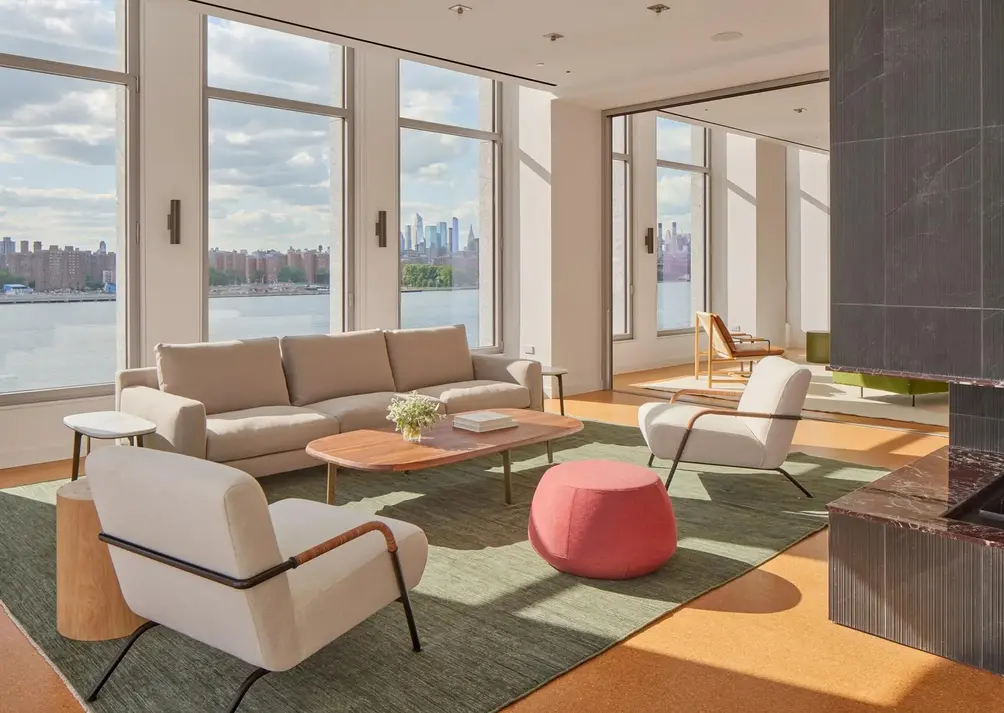
When you live in close quarters, being a good neighbor is essential, but what exactly does that mean? This article drills down on the unspoken rules of being a good neighbor when you live in North America's most densely populated city at a time when more of us are working, exercising, and doing more activities from home than ever.
New developments are adapting by offering well-thought floor plans and generous common spaces, much like those seen at One Domino Square in Williamsburg. However, much of good neighbor behavior ultimately depends on the individuals and families living in these buildings.
New developments are adapting by offering well-thought floor plans and generous common spaces, much like those seen at One Domino Square in Williamsburg. However, much of good neighbor behavior ultimately depends on the individuals and families living in these buildings.
In this article:
Noise!!!
Noise is a constant problem in New York, so everyone needs to play a part in keeping noise levels down. If you happen to be a musician or have young children stampeding around your apartment on a regular basis, one way to be a good neighbor is to make an effort to soundproof your apartment—for tips on how to do so, refer to New York City's Residential Noise Reduction Guidance Sheet. On the flip side, if you're quiet as a mouse but live in a multi-unit building, don't assume all your neighbors are going to embrace your muted lifestyle.
Odors

Living in close quarters means that you’re often not just hearing but smelling your neighbors. While you can report some odors (e.g., sewage odors) to 311 and should always report gas odors to ConEdison immediately, in most cases, odor control is unregulated and relies on everyone being a thoughtful neighbor. Unfortunately, what this entails is also anyone's best guess. After all, some neighbors may love the smell of a steak frying on your grill, and others may find the smell repulsive.
If you want to be a good neighbor, it goes without saying that keeping your windows open while cooking is always a good idea. Likewise, if you want to refinish an old piece of furniture, consider working on the project in a space that is more well-ventilated than your typical New York City apartment. Of course, tolerating odors is also a two-way street, which means being a good neighbor sometimes means tolerating odors you dislike.
If you want to be a good neighbor, it goes without saying that keeping your windows open while cooking is always a good idea. Likewise, if you want to refinish an old piece of furniture, consider working on the project in a space that is more well-ventilated than your typical New York City apartment. Of course, tolerating odors is also a two-way street, which means being a good neighbor sometimes means tolerating odors you dislike.
Smoking
While it is still technically legal to smoke in one's private residence in New York City, New York City’s Smoke Free Air Act (SFAA) prohibits smoking and vaping in common areas of all residential buildings with three or more units. If someone is smoking in a common area, residents can call 311 to report the violation. On the other hand, if a neighbor smokes in their residence, second-hand smoke is not covered by the SFAA. For smokers who are concerned about being good neighbors, the best rule of thumb is to limit indoor smoking and to respect SFAA rules when smoking outdoors by only smoking a reasonable distance away from your building's entrances and common areas.
Pets
You may love your pit bull, parrot, or chimpanzee, but don't assume everyone in your building will share your feelings of affection for your pet. If you're a pet owner, being a good neighbor means ensuring your potentially frightening dog doesn't aggress neighbors, keeping your cat's litter box clean and odor-free, and doing your best to prevent your pet from barking, meowing, chirping, or chatting excessively. If you own a dog, being a good neighbor also means curbing your dog. If not, your neighbors may have legitimate grounds for a complaint (see 311's Dog and Animal Waste section for guidelines).
Children
As the saying goes, “It takes a village to raise a child.” In New York City, this saying is especially true, and it's a two-way street. If you have children, understand that neighbors may not share your tolerance for their noise. If you don't have children, part of being a good neighbor means tolerating the pitter-patter of small feet and occasional late-night crying bouts of children living adjacent to your unit.
Indoor Common Areas
 Lounge at One Domino Square
Lounge at One Domino Square
• Hallways
While leaving an umbrella outside your small apartment on a rainy day may be acceptable, New York City residential hallways are not front porches (certain Brooklyn buildings with private entries notwithstanding). If you want to be a good neighbor, keep your shoes, bags, potted plants, bicycles, scooters, and everything else inside, not outside, your unit. Leaving items outside your unit may also conflict with fire regulations and the building code.• Lobbies
• Like the hallway outside your apartment, your lobby isn't your front porch. It is a shared space, so behave as you would in any other public forum.• Common Rooms
Common rooms are a great place to hold larger gatherings and events that exceed the capacity of your apartment, but that doesn't mean you should feel free to treat the space like any other rental facility. Any mess you leave after your gathering will need to be cleaned up, likely by the porters in your building. Good neighbors treat common rooms in their building as an extension of their private residences, and as such regard them with the same care they would give their homes. Fitness amenities at One Domino Square
Fitness amenities at One Domino Square

• Gyms, Pools, and Other Fitness Facilities
Like other common areas, gyms, pools, and other fitness facilities are public areas of your building. Before stripping down to the buff in your building's sauna or steam room, be mindful of your building's rules, which likely prohibit such behavior. Similarly, playing music or videos without headphones during a workout in this setting is frowned upon.• Storage Rooms
• If you were renting a 6' x 6' x 5' storage unit at a local storage facility, you would likely never leave large items outside your storage cage or locker. Good neighbors follow the same rule when it comes to building storage. If you are lucky enough to live in a building with storage, which is generally significantly less expensive or more convenient than off-site storage options, respect the fact that you're renting a designated space and not the entire storage room.
Outdoor Common Areas
 Rooftop terrace at One Domino Square (CityRealty)
Rooftop terrace at One Domino Square (CityRealty)
If you happen to have access to a building's common garden or rooftop deck, enjoy it, but don't treat the space like a private backyard in the suburbs. If you're enjoying an evening with friends, maintain decorum at all times, which naturally means keeping noise, drinking, and partying to a minimum.
Laundry Facilities
In a city where only a fraction of apartments can legally install a washer and dryer, shared laundry is a way of life. It is also one of the common areas most likely to result in neighborly disputes. While it may seem obvious, a few rules of thumb can help everyone be a good neighbor in shared laundry rules:
- Don't hog washers or dryers (e.g., don't leave clothing in a machine for hours after the cycle is complete or throw just two or three items in ten dryers because you happen to be in a rush).
- Don’t wash excessively dirty items in a shared machine (e.g., poopy diapers or your dog's favorite blanket).
- Don't take your neighbors' laundry out of a washer or dryer so you can use their machine, especially if their cycle is incomplete.
Parking Facilities
Parking has become one of the most sought-after amenities in New York City. As a result, while it may be tempting to take advantage of a parking spot in your residential garage that is normally empty, good neighbors never hog other occupants' spaces. Also, don't turn your parking spot into a garage. Camping equipment, old furniture, and other items belong in a storage unit, not a garage.
Guests
Whether you have a cleaner visit once a week to scour your unit, contractors come in for repairs, or overnight visitors on a regular basis, good neighbors take responsibility for their guests. Ensure that cleaners and contractors are aware of your building's rules and follow them at all times, including rules regarding noise. If you have visitors, ensure they appreciate and respect your building rules.
Would you like to tour any of these properties?

Contributing Writer
Cait Etherington
Cait Etherington has over twenty years of experience working as a journalist and communications consultant. Her articles and reviews have been published in newspapers and magazines across the United States and internationally. An experienced financial writer, Cait is committed to exposing the human side of stories about contemporary business, banking and workplace relations. She also enjoys writing about trends, lifestyles and real estate in New York City where she lives with her family in a cozy apartment on the twentieth floor of a Manhattan high rise.


 6sqft delivers the latest on real estate, architecture, and design, straight from New York City.
6sqft delivers the latest on real estate, architecture, and design, straight from New York City.
